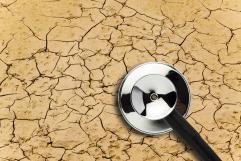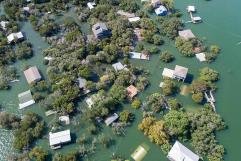
In schoolchildren, it affects the development of lung function and can cause an inflammation of the brain, which could derive in the slowing down in the maturing of a series of functions.
“Pollution has an impact on learning”
Jordi Sunyer is the coordinator of the Children’s Health Programme at the Barcelona Instituto de Salud Global – ISGlobal (Global Health Institute) and he holds a professorship in Preventive Medicine and Public Health at the Universidad Pompeu Fabra. His main lines of research are based on the frequency, source and causes of asthma and chronic obstructive pulmonary disease (COPD); air pollution and cardio-respiratory diseases; and the effects of pollutants on the neurobehavioral development in the first years of a child’s life. He is the founder and coordinator of the INMA birth cohort in Spain and main researcher for different international studies, such as ERC Advanced Grant BREATHE “BRain dEvelopment and Air polluTion ultrafine particles in scHool childrEn.”
At ISGlobal he has carried out a study on the impact of air pollution around educational centres. How does it affect them?
In school children, the strongest evidence revolves around two main effects. One, which has been known about for many years, involves lung function development, how the lungs grow and how their vital capacities decrease, along with the pulmonary flows. And the other factor is related to the brain and its inflammation potential, with a disorganisation of the different neuronal networks. They do not work perfectly and there is a slowing down in the maturing of a series of functions.
Does this mean learning problems?
Yes, we see this in some studies that have evaluated learning. But these studies must be carried out very well because there are many variables that intervene, such as the quality of the teachers or of the school. To do these studies, you need very large populations. There are some in the U.S.A., South America or Japan. Without any doubt, pollution implies a disadvantage. We cannot say whether this disadvantage affects individuals and is noticed in the learning processes, because we have not been able to evaluate it; but we have managed to do this for groups. This means that, if the pollution persists throughout the school years, it is certain to have an impact on learning in the end.
Does it affect attention deficit?
Pollution affects the degree of attention, in both boys and girls. Some studies find it affects boys more and others find it affects girls more. It is not clear, although it seems that boys are more vulnerable than girls regarding brain maturing. For this reason, childhood brain disease mainly affects boys.
"The effects on the children’s brains that we have studied could be reversible if pollution is eliminated”In the case of pollution, which are the most hazardous agents?
Classically, there has been a great deal of literature about lead. The impact on the IQ caused by having higher lead levels in the blood meant that lead was eliminated form petrol, which resulted in a change in the world industry and in the automobile industry. Where did this lead come from? Mainly from petrol, but also from other places such as lead piping or industry. Since then, there have been suppositions that several metals, inhaled as particles could be responsible for these brain development problems, which can lead to mental health disorders in children. But with the current pollution levels, this has been extended not only to the metals that could be in the particles, but also to the particles themselves. Lately, the most concerning elements are the ultrafine particles that are directly emitted by all diesel vehicles and in a lesser proportion, petrol cars. In a secondary way, these particles would also form when the gases in the atmosphere clot or precipitate as particles.
There are other studies that talk about the effects of pollution on pregnant women.
We started our research in this area in 1994. We were the first to see that when we made models using measurements in cities and houses, the pollution that a woman breathed throughout the entire pregnancy caused some delay in the baby’s birth weight, or it even could moderately increase premature births. This was not seen on the same scale as produced by tobacco, which can reduce the weight of a foetus by 250 grams. Here we are talking about 50 or 70 grams, but it was noticeable. These findings, which have been reproduced in many studies, opened up the door to research on the impact of pollution in cities. We were no longer only talking about industrial pollution, but rather the pollution that anyone breathes in when they walk, an emission source that is very close at hand. At first, it was thought that pollution affected the respiratory system; at the end of the 20th century it began to be obvious that it also produces cardiovascular effects; and over the past few years, we have started to see that it goes way beyond the cardiovascular and respiratory tracts and that it produces a reproductive alteration. And this is what we are now studying in depth.
Are these effects reversible?
The effects on the children’s brains that we have studied can be reversible if the pollution is eliminated. We believe this to be true due to indirect evidence. A low birth weight has an effect that continues through the rest of the child’s life. For this reason, we are studying the impact on the brains of foetuses and newborns to see whether prenatal exposure is reversible or not; but what is known by all reproductive medicine at present is that the impact of birth weight increases the risk of respiratory problems that continue throughout life.
Removing cars from cities is a long term project. What can we do in the meantime?
I think that this idea of long term must change. We should not accept it. The evidence is very strong. We know that pollution is one of the top factors in loss of health. It is said that it results in several million deaths a year in the world: a great deal more than caused by Covid-19. We are talking about eight or ten million deaths due to combustion particles. The changes must be made now. Greater traffic restrictions must be brought in around schools. Currently, only 20% of centres have seen any kind of intervention. In London, a few weeks ago, 500 schools called a strike, to demand that families should not do their children’s school run by car. There is a great deal to do. It is very complicated, but we must move faster than we are at present. Other effects of climate change that also affect health are temperatures and rainfall variability. Plants flower earlier and for longer periods, which has an effect on allergies and asthma. We have seen that pollutant particles interact with the pollen and there is an increasing amount of data showing that where there is vegetation and pollution, the risk of developing immune, allergy problems increases.
Other effects that have been studied include the link between food and water pollution by hormone disruptors. How does this affect children’s health?
The most important effect that we have found up to now is on growth and obesity. We have studied the effects on the respiratory tract, and unquestionably we have seen that they effect the development of asthma, for example, undoubtedly due to hormone properties. But the area where we find the greatest effects is basically obesity. Childhood obesity is a significant epidemic and a very serious problem.



